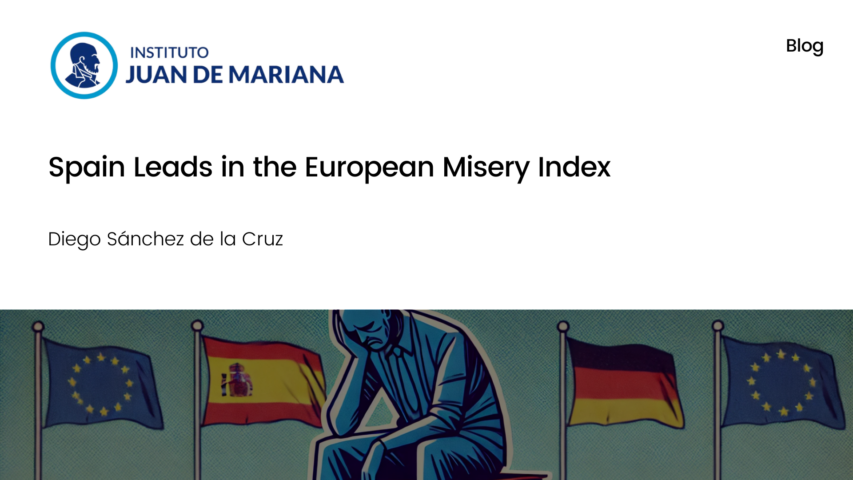Spain Leads in the European Misery Index

Spain Leads in the European Misery Index
Diego Sánchez de la Cruz // 26 November 2024
The newly released Misery Index, compiled by the Instituto Juan de Mariana, provides a detailed analysis of economic hardship across the European Union, focusing on unemployment and inflation as its key indicators. The report offers valuable insights into the economic conditions of member states, revealing significant disparities. Based on the Okun Misery Index methodology, which combines the unemployment rate with the Consumer Price Index (CPI) inflation rate, this analysis sheds light on the challenges faced by EU citizens.
At the end of 2023, Spain recorded the highest Misery Index in the EU, with a score of 15.2 points—60% higher than the EU-27 average of 9.5 points. Spain’s performance stands in stark contrast to comparable economies like Italy (7.7) and Portugal (8.4). Greece, previously at the top of this unenviable ranking, has improved its position due to lower unemployment levels (10.6% compared to Spain’s 11.9%).
By mid-2024, Spain’s Misery Index had marginally improved to 14.4, yet it still led the EU, maintaining a 5.6-point gap above the EU-27 average of 8.8 points. Worryingly, this gap has only narrowed by 0.1 points, signalling significant challenges ahead for Spain. Among the best-performing member states are Slovenia (4.7), Czechia (5.2), Malta (5.3), Germany (6.0), Ireland (6.2), and Denmark (6.8).
The results for the entire EU can be found in the following chart:
|
EU Member State |
Unemployment rate (M07/24) |
Consumer Price Index (M07/24) |
Misery Index July 2024 |
|
Spain |
11.5 |
2.9 |
14.4 |
|
Greece |
9.9 |
3.0 |
12.9 |
|
Romania |
5.4 |
5.8 |
11.2 |
|
Estonia |
7.5 |
3.5 |
11.0 |
|
Belgium |
5.4 |
5.4 |
10.8 |
|
Sweden |
8.6 |
1.7 |
10.3 |
|
France |
7.5 |
2.7 |
10.2 |
|
Lithuania |
8.0 |
1.1 |
9.1 |
|
Eurozone |
6.4 |
2.6 |
9.0 |
|
Finland |
8.5 |
0.5 |
9.0 |
|
Portugal |
6.2 |
2.7 |
8.9 |
|
EU-27 |
6.0 |
2.8 |
8.8 |
|
Luxembourg |
5.8 |
2.7 |
8.5 |
|
Hungary |
4.3 |
4.1 |
8.4 |
|
Croatia |
5.0 |
3.3 |
8.3 |
|
Slovakia |
5.3 |
3.0 |
8.3 |
|
Italy |
6.5 |
1.6 |
8.1 |
|
Austria |
5.0 |
2.9 |
7.9 |
|
Cyprus |
5.4 |
2.4 |
7.8 |
|
Latvia |
6.9 |
0.8 |
7.7 |
|
Netherlands |
3.6 |
3.5 |
7.1 |
|
Poland |
2.9 |
4.0 |
6.9 |
|
Bulgaria |
4.0 |
2.8 |
6.8 |
|
Denmark |
5.8 |
1.0 |
6.8 |
|
Ireland |
4.7 |
1.5 |
6.2 |
|
Germany |
3.4 |
2.6 |
6.0 |
|
Malta |
3.0 |
2.3 |
5.3 |
|
Czechia |
2.7 |
2.5 |
5.2 |
|
Slovenia |
3.3 |
1.4 |
4.7 |
Economic conditions across the EU vary widely. In some cases, excessive inflation drives poorer results, while in others, high unemployment is the primary factor. For instance, in July 2024, the EU’s average CPI stood at 2.8%, closely mirrored by Spain’s 2.9% and Greece’s 3.0%. However, unemployment rates in these two countries were significantly higher, at 11.5% and 9.9%, compared to the EU average of 6%.
The Instituto Juan de Mariana also highlights statistical manipulation by the Spanish government, which reclassifies inactive workers as employed, artificially lowering the official unemployment rate. This manipulation suggests the real unemployment rate in Spain may be nearly five percentage points higher, emphasising the need for greater transparency in economic reporting across the EU.
The best-performing country in the latest Misery Index is Slovenia, with a score of 4.7 points. Czechia, Malta, and Germany follow closely, with scores of 5.2, 5.3, and 6.0, respectively. These countries benefit from strong labour markets and a clear focus on controlling inflation, which contributes to their lower scores.
The report also explores the negative economic impact of high taxation, using Spain as a case study. A regression analysis conducted by the Instituto Juan de Mariana shows that Spanish regions with lower taxes perform better on the Misery Index. Over the past five years, Spain has seen the sharpest increase in tax revenue among EU member states, equivalent to 3 percentage points of GDP, compared to the EU average of just 0.1%. This tax burden exacerbates both unemployment and inflation, contributing to Spain’s consistent position at the top of the Index.
Between 2019 and 2024, Spain consistently ranked as the EU country with the highest Misery Index, while Greece, once the worst performer, has shown notable improvement. Labour market reforms in Greece have paved the way for a recovery from a decade of economic mismanagement. Meanwhile, countries like Malta, Germany, Denmark, Ireland, Slovenia, the Netherlands, and Luxembourg have maintained lower scores, ranging from 42.3 to 55 points during this period. In contrast, Baltic states such as Lithuania, Estonia, and Latvia have struggled with persistently high CPI figures, significantly affecting their Index performance.
|
EU Member State |
Unemployment Pillar |
CPI Pillar |
Misery Index (2019-2024. M07) |
|
Spain |
82.1 |
20.8 |
102.9 |
|
Greece |
82.6 |
17.6 |
100.2 |
|
Lithuania |
42.9 |
39.2 |
82.1 |
|
Estonia |
39.0 |
41.8 |
80.8 |
|
Latvia |
43.0 |
37.3 |
80.3 |
|
Romania |
33.6 |
42.4 |
76.0 |
|
Hungary |
23.5 |
51.6 |
75.1 |
|
Slovakia |
37.0 |
36.4 |
73.4 |
|
Italy |
51.3 |
20.3 |
71.6 |
|
Sweden |
48.6 |
22.5 |
71.1 |
|
Croatia |
40.0 |
29.2 |
69.2 |
|
France |
47.1 |
20.9 |
68.0 |
|
Eurozone |
43.4 |
22.6 |
66.0 |
|
EU-27 |
39.5 |
25.5 |
65.0 |
|
Finland |
45.4 |
17.6 |
63.0 |
|
Bulgaria |
27.0 |
34.3 |
61.3 |
|
Austria |
32.6 |
27.6 |
60.2 |
|
Poland |
18.5 |
40.8 |
59.3 |
|
Portugal |
39.6 |
18.9 |
58.5 |
|
Belgium |
33.8 |
24.5 |
58.3 |
|
Cyprus |
39.6 |
17.6 |
57.2 |
|
Czechia |
15.6 |
41.1 |
56.7 |
|
Luxembourg |
33.5 |
21.5 |
55.0 |
|
Netherlands |
24.8 |
27.9 |
52.7 |
|
Slovenia |
25.4 |
24.6 |
50.0 |
|
Ireland |
30.8 |
18.8 |
49.6 |
|
Denmark |
30.8 |
17.2 |
48.0 |
|
Germany |
19.6 |
24.0 |
43.6 |
|
Malta |
22.7 |
19.6 |
42.3 |
The report highlights the persistent issue of stagflation in Spain, characterised by high inflation and low growth—a scenario reminiscent of Western economies in the 1970s and 1980s. Mario Draghi’s recent report on EU competitiveness highlights the need for liberalisation policies to address this malaise. Deep labour market reforms, monetary stability, competitive markets, smart regulation, and budgetary restraint are key to improving a country’s performance on the Misery Index. Fiscal profligacy, particularly through increased taxation during periods of stagnation, exacerbates economic challenges and should be avoided. Instead, governments must focus on improving the efficiency of public spending and reducing waste.
Inflation’s cumulative effect on household purchasing power is another pressing concern. In Spain, inflation under Socialist Prime Minister Pedro Sánchez has led to an accumulated CPI of nearly 20%, disproportionately affecting lower-income households and fuelling social unrest. Similar patterns are visible in other EU countries with higher inflation rates.
The findings of the Misery Index have significant implications for EU economic policy. They highlight the stark economic divergence between member states, with nations like Spain and Greece facing severe challenges while countries such as Germany and the Netherlands perform much better. This growing gap undermines the EU’s goal of economic convergence and demonstrates the urgent need for struggling nations to adopt successful policy frameworks seen in better-performing states.
Diego Sánchez de la Cruz is Head of Research at Instituto Juan de Mariana and CEO at Foro Regulación Inteligente.
To read the full report in Spanish, click here.
EPICENTER publications and contributions from our member think tanks are designed to promote the discussion of economic issues and the role of markets in solving economic and social problems. As with all EPICENTER publications, the views expressed here are those of the author and not EPICENTER or its member think tanks (which have no corporate view).



